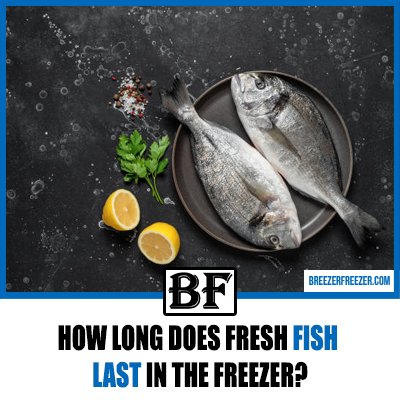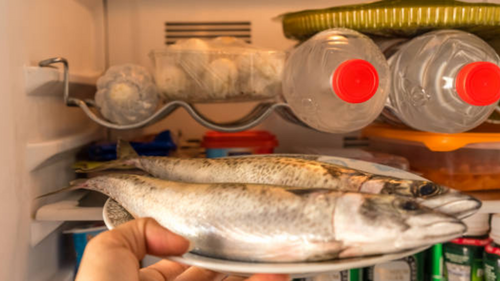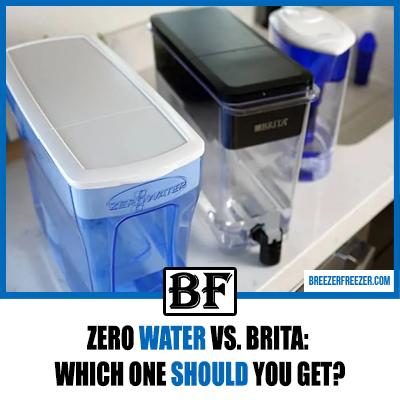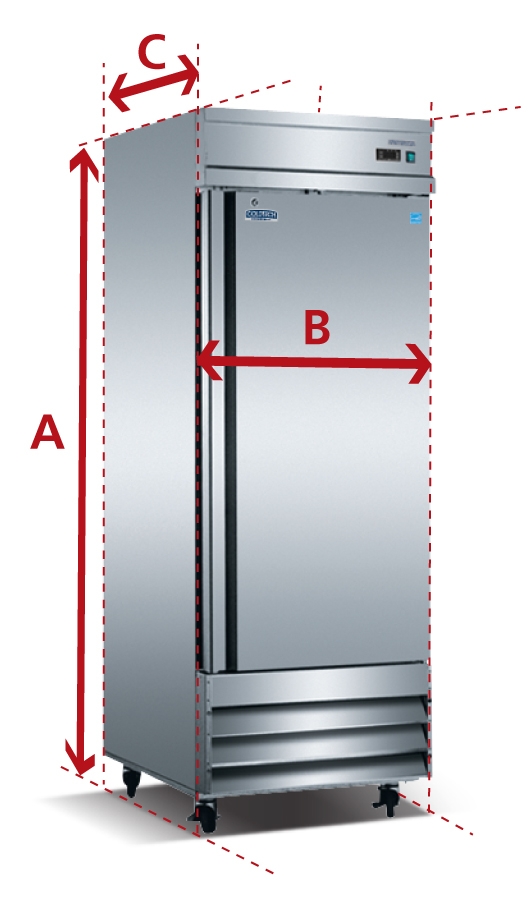How long does fresh fish last in the freezer?
If you are not one of those people who can visit the grocery store every day or when you want, you will know that food can sit around for some time before you get to cooking it. Having fish in the fridge can seem like a ticking time bomb. If you are busy, it’s easy to forget about the fish until the fridge door opens and you are met with that awful smell. Can all fish be frozen?

Did you know fish spoil faster than other meats because of their body temperature? That is a result of the waters they swim in? Once out of the icy cold water, the fish rises in temperature, and microorganisms get busy eating the fish and creating a hell of a stink!
This article investigates fish to find out how long fish last when frozen. We answer many frequently asked questions, providing factual information to improve your culinary knowledge.
Let’s dive in.
Do frozen fresh fish expire?

According to the USDA, it’s good in the freezer indefinitely, but many of you will beg to differ with this USDA opinion.
There is a kind of back story with fish that shapes how you deal with fish that you should know before you plunge headfirst into buying your next fish meal.
Fish are cold-blooded critters that live predominantly at depths where the water temperatures can be as low as 39℉ and lower. This is like a walk in the park for them on a sunny afternoon in a T-shirt.
Removing the fish from the water and placing it in the fridge at 40℉ is not chilling the fish and will do virtually nothing to prevent the biological activity that is now making the fish decay and turn horrible and smelly.
Now compare that to meat, say a pork chop or beef steak, they come from warm-blooded animals, and when the meat is placed in the fridge, the biological activity slows because it is not used to living in cold temperatures.
To know how to buy extra time for your fish, you just need to take one look at the fish counter at your grocery store. The ice is not just a pretty way to showcase fish. It keeps the fish cold.
Even in the fridge, the fish should be on the ice, even if it is just for a few hours. Place the fish in a Ziploc bag and then use crushed or flaked ice. Yes, it makes a difference.
Crushed or flaked ice has a greater surface area than ice cubes, so that the fish will stay colder. Don’t place your fish on the ice or cover it with ice. The ice melt will wash the flavors from the fish, making it bland.
Ok, the question is, what about those warm-water fish that live in the pacific? Does refrigeration slow down the spoiling process for those critters?
The answer is yes, it does. Fresh fish from warmer waters will last a week in the fridge, whereas its cold water cousins last for three days max. The cold water fish can last for 5 days on the ice, and the warm water fish will last for two weeks in the fridge.
But wait. That assumes that the fish you buy is fresh!
Does fish need to be covered in the fridge?
Yes, it will last better if it’s covered, wrap the fish in cling wrap or foil, place the fish in an airtight container with a bed of ice, and then cover the fish with ice.
Keep your fresh fish as cold as possible if stored for a day or two before cooking.
Can you put a warm fish in the fridge?

It is not advisable, but sometimes you may not have a choice.
If you read online that you can’t put a warm fish in the fridge because of condensation coalescing into water droplets that will drip and make your fish soggy and less appealing at best is the main reason you can’t put the warm fish in the fridge, you are being misled.
Your fridge temperature will be 40℉ -18℃ or a little lower. Placing a warm fish in the fridge will elevate its temperature while it radiates heat.
Your fridge may not be as efficient as you might have thought at removing heat. Most fridges take hours to come to 40℉ after being switched on after cleaning.
So, what’s the big deal? The big deal is that food sitting at a temperature of 40-140℉ is in the food danger zone. It’s not just your fish. It is the contents of the entire fridge.
Above 40℉-18℃ bacterial growth on perishable foods will accelerate exponentially. It should be discarded if the food remains at an elevated temperature above 40℉-18℃ for just two hours.
Seems harsh? According to the USDA, after two hours in the food danger zone, perishable foods contain enough bacteria to cause food poisoning.
Furthermore, the fish should be covered in the fridge so there will be no condensation!
What happens if you have no choice, you need to be out of your home for a few hours? Separate the fish so they are not touching. This will allow the heat to dissipate, and the fish cools faster. Place the fish in an airtight container.
If you are out of time, wrap the fish container in a towel to act as insulation to prevent the fridge from heating dramatically.
How long can fish sit out?
Two hours. Remember the food danger zone? According to the USDA, perishable goods sitting out for two hours should be discarded, and the bacteria growth on the food has multiplied rapidly, making the food unfit for consumption.
Eating food sitting out for two hours or more could cause food poisoning.
How long does fish last in the fridge?

According to the USDA, 2 days. But this does not take into account the type of fish, where it’s from, if it’s cold water fish or fish that swims in warm oceans like marlin and snapper.
2 days is a broad sweeping statement that is going to be a bandaid for every problem keeping you safe from food poisoning, which is commendable in every sense. However, the subject is deeper than this and should be looked into further.
So skimming past the subject would be remiss.
If you have fresh fish and you know it’s fresh, your fish from cold waters like Salmon, Cod, and tuna will last for two days. If you place the fish on a bed of ice in an airtight container and then cover it with ice (fish should be in a bag), it will last for 4 to 5 days.
If you have fish that swim in warmer water, say from Florida, like snapper, Marlin, they will last in the fridge without you touching them for almost a week, and placed on the ice, they may last for two weeks.
Clearly, there are some caveats. The fish has to be fresh, almost straight from the boat. And the Fish should be stored correctly. Every minute the fish is outside of the water, and at air temperature, it degrades, so cooling the fish is essential.
Does frozen fish go bad?
According to the USDA, it will last forever, which is incorrect. The fat content of fish plays a significant role in how long it can be frozen.
Fish with a lot of fat, like salmon, has a shorter shelf life in the freezer. Ever you do it. The fat will break down and spoil the fish. Whereas leaner fish like catfish last a couple of months longer in the freezer, broad sweeping statements could lead you the wrong way.
Do you know that your fish will have a shorter shelf life in a frost-free freezer? Indeed, the freezer never maintains a constant temperature, and while it is convenient not to defrost your freezer, your food will have a shorter shelf life.
Why doesn’t the first free freezer maintain a constant temperature? Because it is not magic. When the freezer reaches the preset temp, the freezer switches off, which prevents ice build-up. The freezer switches back on when the thermostat picks up a temp increase. That’s how they work.
How to freeze fresh fish in water
- Fish are susceptible to freezer burn, so use this technique to eliminate freezer burn that could ruin your fish.
- Gut and clean the fish as if you were going to cook it. When it is clean, salt the fish in and out. This will draw water from the fish, making the fish firmer, and preventing crushing ice crystals from forming in the flesh.
- Take a Ziploc-type freezer bag and label it (do it this way. It will be easier).
- Submerge the fish in the bag of water and seal it.
- Place in the freezer, ensuring there are no leaks.
If you want to preserve fresh fish for 2 years, it must be vacuum packed.
- If you have access to a vacuum packaging machine, this is how to use it to freeze fish.
- Gut and clean the fish.
- You can vacuum pack while fishing, but if the fish is large, cut it into portions.
- Place the fish in the special vacuum packing bag.
- Place the nozzle into the bag and commence vacuuming the air from the bag. This is an automatic process. When the air is extracted from the bag, the bag will be heat-sealed.
- Mark the bag with the contents and expiry date, two years from the freezing date.
- Place the bag in the freezer.
Final thoughts
There is more to freezing fresh fish than meets the eye, and with a little knowledge, you can make fresh fish last longer, preventing waste.
The table below should jog your memory.
| Fish Category | Frozen Without Water | Ice Glazing | Water Frozen | Vacuum Sealed |
| Lean: | Up To 6 Months | 6 Months | 6 Months | 2 Years |
| Fatty: >4% fat | Up To 4 Months | 4 Months | 4 Months | 2 Years |




![Why is My Frigidaire Refrigerator Water Dispenser Slow? [Solved!]](https://breezerfreezer.com/wp-content/uploads/2023/07/Why-is-My-Frigidaire-Refrigerator-Water-Dispenser-Slow.png)